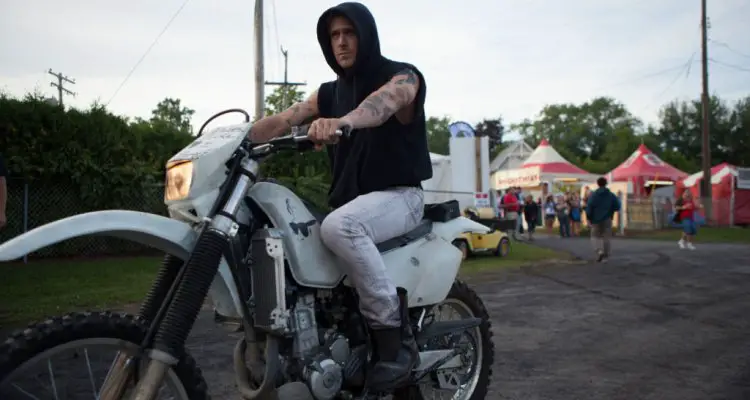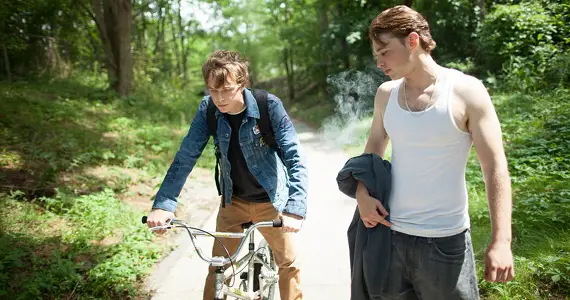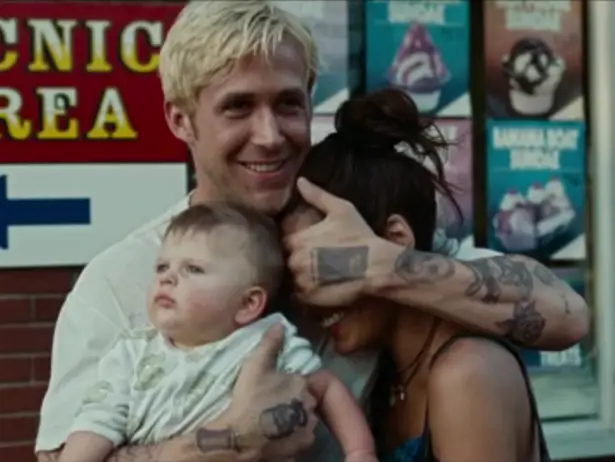THE PLACE BEYOND THE PINES Is Confusing and Contrived

Manon de Reeper is the founder and CEO of Film…
The Place Beyond the Pines tries to be an interesting movie, but above all is just very confusing.
We start off the story with Luke Glanton (Ryan Gosling), motor stunt rider. He finds out he got a baby with a woman, Romina, in one of the towns he visited during his circus travels. Romina leads a poor but relatively stable life with another man, but Glanton decides he wants to take care of the baby and to be there for Romina. Glanton forces his way into her life and gets a job nearby as a mechanic. However, the job doesn’t pay enough. This leads to a series of bank robberies. The movie then, at the 50 minute mark, shifts to a different main character, Avery Cross (Bradley Cooper), a policeman. He finds out about and fights corruption in his precinct, and with the help of his retired judge dad, he successfully does so. Then, a little more than half an hour later into the movie, we jump 15 years forward into the story, where Avery buries his dad, is making a run for General Attorney and his son AJ comes to live with him. We now follow AJ. AJ (Emory Cohen) is a derailed brat who uses drugs and mistreats his friends, among which Jason (Dane DeHaan), who appears to be Glanton’s son.
I’m really trying to lay out the story without spoiling anything important, but it’s hard to make it into something coherent. That was the biggest problem with this movie, though. The first part is about a guy who robs banks, the second part is about police corruption and the third part about two struggling kids. Honestly? They should have scratched two of these three parts and have fleshed out that one part more so that at least the theme is clear. In the end, I was confused what or whom this movie was really about – I think even director and screenwriter Cianfrance wasn’t sure.
I found it awfully hard to care about any of the characters. Too much attention was given Luke Glanton, who appeared to be somewhat of an unimportant character. Not important enough, at least, to warrant the level of detail shown. Instead of going for a choppy triptych, they should have either interlaced the life of the cop from the start, or they should have cut the first part down by at least 20 minutes. The film is too long at 140 minutes, even despite skipping parts I though would have been more interesting than other scenes that were chosen to be shown. As is, the movie is slow and tough to get through.
Another point of criticism: a large part of this movie was in close-up. This always makes me feel slightly claustrophobic, especially when I have the idea we could have learned a lot more about the characters and their lives if their surroundings were shown more extensively. Plus, close-up is just not very interesting in scenes that aren’t very emotional, or where the actors fail to deliver.
Ryan Gosling tries the best he can with fairly flat character Luke Glanton, the scenes he sparkles are the violent ones. However, the robbery scenes didn’t work for me, they are overacted – Gosling tries to portray the nervousness of Glanton (who has his head covered with helmet and glasses) with a breaking voice. It’s interesting when shown first, especially compared some of to the other flat scenes, but the repetitive use of the voice (and the robbery scenes in general, actually) is boring.

The most interesting character in this story, in my opinion, is Jason, Glanton’s son, portrayed by Dane DeHaan. Jason, who has two loving parents, still has an unsatiable hunger to find out more about his mysterious biological father. He uncovers secrets he couldn’t have imagined, making for great conflict.
DeHaan is, I think, one to watch. He was noteworthy in Chronicle (2012) and in the past year and a half, he’s been in a big handful of big movies. In The Place Beyond the Pines, especially the scene near the ending, with Bradley Cooper in the forest, was great. A riveting and emotional scene, one in my opinion the movie should have ended with, or at least much sooner after that.
On a final note, the best scene of this movie was right after the first robbery, where Luke Glanton and his accomplice Robin dance with Robin’s dog. It had a certain humorous contradictive innocence over it.
Discussion
The following contains spoilers.
At around the 53 minute mark, the following was said:
“[You] got rid of another bad guy, and you’re the hero”
This is what the chief of police and the District Attorney tell Avery Cross right after he shot and killed Luke Glanton and feels bad about it. We, the audience, are essentially told here by people in authoritative positions that it doesn’t matter that “bad guys” are “gotten rid of”, and that you definitely shouldn’t feel bad about it.

But how bad was Glanton, really? He got into crime because he was A) poor, and B) he had a friend who could teach him how to do it. It was his situation that forced him, and his friend opened the gate. Essentially though, he just wanted to help Romina and his kid, even if his approach to it was rather blunt. But his intentions were good.
Interesting too, but very different in topic, is the struggle of Avery Cross with police corruption. Cross the good cop is surrounded by bad guys – not just criminals, but also his colleagues (and boss), and he could conveniently participate in the corruption to make a lot of money. He chooses not to, because lucky for us, there is always one good cop that will save the day by ousting them (and man, does The Place Beyond the Pines throw this in our faces with brute force – the day Cross returns to the precinct after his rehabilitation from the shot in his leg, he is treated like a saint, even accompanied by church music).
This part of the film is very classic cop film, and quite cliché in its black and whiteness (as is Ray Liotta as really bad bad cop). This kind of plot tends to make the audience feel better about the world, they make it seem as if corruption is something that we can concretely fight. In the real world though, it’s just not as easy.
My last question is this: why the hell were the two kids, who just bought some drugs, picked up by the police? They were just two (white) kids walking down the street, not even behaving so suspiciously. It felt quite contrived.
Thoughts?
Does content like this matter to you?
Become a Member and support film journalism. Unlock access to all of Film Inquiry`s great articles. Join a community of like-minded readers who are passionate about cinema - get access to our private members Network, give back to independent filmmakers, and more.
Manon de Reeper is the founder and CEO of Film Inquiry, and a screenwriter/producer. Her directorial debut, a horror short film, is forthcoming in 2021.













